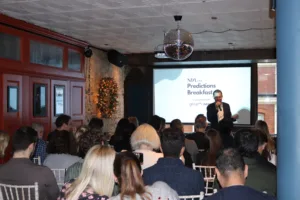By Zoja Paskalijevic, partner at M&A advisory firm, Ciesco
The acquisition of MGM by Amazon signals a redistribution of eyeballs and money from traditional TV to streaming. And this will have a commercial impact on big media agencies already considering how to navigate a new landscape. The heady years when Mad Men struck Mad Deals over lunch with Mad Media owners are long gone; into a world historically carved up into kingdoms by network agencies has come something entirely new: Facebook, Google, and other tech companies.
They have ambitions not just to find a home in this landscape, but to wipe it clean and start again. And the result of this, and increasing digitalisation, (as well as rising adoption of, and enthusiasm for, tech), is enormous pressure on those network agencies and their Achilles’ heel: the media agencies, high-margin businesses advising companies how and where to engage with consumers.
The changes in this ecosystem have been propelled by changing media usage among consumers. Mad Men Paradise: Mass media, easy push advertising, one message to many, via OTS (Opportunity To See, still a key questionable KPI where media monies are thrown at)
Challengers Paradise: Every touchpoint is a data point, with tailored asset and activation strategies, with an opportunity to convert (be it brand lift or a transaction).
The problem for network agencies is that though they are often given global work by big brands and carry considerable prestige, media volume—the key driver in media pitches—is no longer the only factor when buying media. The tech giants of Silicon Valley have made sure of that; anyone with a certain degree of expertise and a computer today can buy social and biddable media at competitive rates. And since these networks need a high margin just to keep on existing, they are attached to their media agencies, even though GAFA has parked its tanks on those agencies’ lawns.
Accordingly in the walled gardens of GAFA, data, analytics, insights, workforce, workflow, asset creation, activation, measurement and commercial implications have come to define modern marketing. And this was before covid (the new BC); Facebook and Instagram’s 2020 revenues broke records. (Google’s and Amazon’s advertising, too.) Another source of discomfort is looming just over the horizon. Television, the home turf of network agencies, is under severe pressure.
The emergence of Netflix, Amazon Prime and Disney+ have ignited streaming wars. Seven Oscars went to Netflix. One went to Prime. So do not be surprised when they start monetising their audiences via advertising slots, sponsorships, brand, product and services integrations. Netflix may well become the next waller garden—probably biddable, addressable, and not pushing too much advertising, but highly tailored to the Netflix consumer-first approach.
All the while, at network agencies, there were hiring and salary freezes and inertia, condemning them to have to deal with a radically new context in an old-school way. Digitalisation accelerated, data shot up in value, and agility and flexibility—already thought to be unqualified virtues in any modern business—became even more desirable. Unable to invest in the talent they need to flourish in this new landscape—at least without increasing revenues—network agencies have found themselves in a catch-22. They need new talent to drive revenue, and higher revenues to hire talent. And though they will find ways to adjust and adapt, they have created a huge opportunity for their independent counterparts in the meantime.
Why? Because independent agencies, unshackled from legacy ways of working, can use this window of opportunity to sweep up a wealth of available talent; some, if not many, of those available to hire will be desperate to throw themselves into a worthy new project post-pandemic. Liberated from stock market expectations, independent agencies can afford to take a hit in margin in the short term—remaining profitable and attractive with a margin of 20 to 30 percent—if it means they can invest in recruitment, sophisticated tech tools, and whatever else they can to increase flexibility and agility and make smart partnerships and pull away from the pack. They are free, in other words, to look to the future, and to arm themselves with the means to gather data and insights so they can tweak their strategy on the fly.
But indie agencies have, if not a fatal flaw, then at least a major weakness. They have no global presence, no real footprint in key markets outside of their own. In the US, UK, European markets, China, Singapore, Latin America and others, agencies need to have the means to gain a foothold. And for so long as network agencies have this advantage over their independent counterparts, they will hold the upper hand. Big clients will go with big agencies, in part because if that agency does not have a presence in a certain territory, it does have the means to establish one.
But SMB/B2B and DTC start-ups are increasingly becoming global players, as GAFA give them the means to communicate with their target audiences on a global scale. They do this not with a global agency, but a dedicated indie specialist.
The fact is that SMBs do not feel that networks are their natural partners. Those businesses hardly match the commercial magnitude of the big brands. What they do need is individual dedication, not a one-size-fits-all-eyeballs approach; that approach was created by the big agencies in order to streamline their ways of operating and accommodate stock market needs.There is a solution for these hungry independent players, and it exists in the shape of private equity. Private equity firms, who raised record sums of money in 2019, are eager to invest after a cautious 2020, and are interested in particular in tech-enabled, data-driven agencies with the skills and tools to thrive in a volatile world. Not any PE firm will do, of course: they must suit the agency in question.
But they have the deep pockets needed to invest in talent, tech and territories, the triplet pillars of the agency of the future.
And not any agency will do either. Private equity investors are interested in those businesses with both eyes on the future. They like data. They like analytics. And they appreciate the need for alternative global media agencies. For independent media players to attract this kind of money and strategic support, they must tick those boxes: they must show themselves to be progressive where technology is concerned, and able to use insights, through data, to inform their decisions and facilitate their creativity. But these players must be careful. Open Source is needed in a world of continuous flux.
A technology-agnostic philosophy seem to be preferable to investing in a so-called Proprietary Frankenstack that may be obsolete the next time Apple updates iOS or Google kills cookies.
The ability of independent agencies to thrive in this peculiar moment hinges on their ability to find a partner willing to commit to them. Any agency with the right combination of tech, talent and vision can go far, but it is the support—financial and otherwise—that an agency needs to go truly global, and that will be the differentiator in our brave new world. Network agencies will find their way to navigate these uncharted waters, and overcome those legacy ways of operating that are hindering their progress.
That means that though there is a window of opportunity for independents, they need to act fast to be able to get a land grab.








